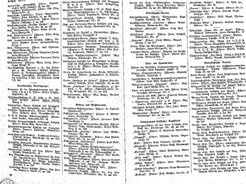The Delitzsch Project – Class Structures and Networks in a German Small Town before Hitler came to power
Research Motivation: the image of German society

Delitzsch - A Prussian small town
© Hendrik Tieke
The six decades before Hitler – we know only very little about the social life in small towns from this momentous era of German history. The most prominent theories on German society mainly stem from studies of towns and cities with more than 20,000 inhabitants. Albeit only a minority lived there: in 1903, for example, it was only 16 per cent of the German population. Thus, gaining new insights into the society in small towns could in the future pave new ways to a more balanced picture of German society.
Research Site: a very average Prussian small town
I conducted my fieldwork in Delitzsch, a Prussian small town. It was founded in the high Middle Ages and had a little bit of everything in the period of the German Empire and during the Weimar Republic: crafts, small and big factories, various shops, a few traders, large farmsteads in the surrounding area, and well-established train connections to regional centres like Leipzig or Halle. At the same time, the large protestant majority (more than 96 per cent) made religion highly unlikely as a dividing factor in social life.
Preliminary results: social class played only a minor role in Delitzsch
My main interest is the question, whether Delitzsch's inhabitants established social relations according to their class or occupational status. My preliminary results show that there were indeed certain social affinities between some occupational groups. However, Delitzsch did certainly not have a split class society, as it is often assumed for German society as a whole during that period. Tailors and foremen sometimes went to the same clubs as factory owners or professors, and occasionally even higher civil servants married daughters of the higher skilled working-class. Furthermore, everyone seemed to be involved in the local “Verschönerungsverein” (town improvement association), which aimed at the betterment of the entire city.
Possible Explanation: small towns were ... small
One possible explanation for the weakness of social class barriers could be, that towns like Delitzsch were small. They did not offer people enough opportunities to live socially separated from one another: There were simply too few people in order to form a class-based football team, and the town itself was too small for class-dominated neighbourhoods. Local festivals, which took place a few times each year, periodically required all inhabitants to cooperate beyond the borders of their social class or status.

Delitzsch's associations in the early thirties
© Museum Barockschloss Delitzsch

